|
|
|
Sort Order |
|
|
|
Items / Page
|
|
|
|
|
|
|
| Srl | Item |
| 1 |
ID:
114740
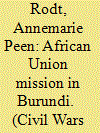

|
|
|
|
|
| Publication |
2012.
|
| Summary/Abstract |
In 2002, the African Union (AU) was established to promote peace, security and stability on the continent. Since then, it has launched military operations to help regulate conflicts in Burundi, Comoros, Sudan and Somalia. This contribution evaluates the African Mission in Burundi (AMIB). It explores the AU's nascent approach to peacekeeping and investigates the relationship between its aspiration, experience and prospect of providing 'African solutions to African problems' in the security realm. The AMIB case study suggests that both the intervener's capabilities and the conflict context in which it operates affect its success. How these two categories relate to each other also matters. Different actors affect both internal and external contextual conditions. More support from one actor can compensate for less support from another. During AMIB, South African commitments made up for limited resources on part of the AU, its member states and institutions as well as insufficient interest from international donors.
|
|
|
|
|
|
|
|
|
|
|
|
|
|
|
|
| 2 |
ID:
115262
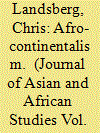

|
|
|
|
|
| Publication |
2012.
|
| Summary/Abstract |
In his book In the Twilight of the Revolution (2009), which is also the subject of this review article, Kwandiwe Kondlo argues inter alia that: '. . . the Africanist orientation of the PAC [Pan-Africanist Congress] was appropriated in the policies of [South Africa's] . . . new democratic government(s), especially during the period of former President Thabo Mbeki' (2009: 282). This author critically examines Kondlo's assertion in the context of South Africa's post-apartheid period and argues that successive South African governments played pivotal roles in helping to shape Africa's evolving inter-state system through diplomacy and the politics of partnership. In that regard, he argues that South Africa's aim is to promote Continentalism (agreements or policies that favour regionalization or regional co-operation between states, or deep and regulated forms of regional co-operation between nations within a continent), a new post-Cold War foreign policy paradigm on the continent, which will assist in the consolidation of the idea of a union of African states that dawned with the birth of the African Union (AU), created to replace the Organization of Africa Unity (OAU). He insists that, in the context of Kondlo's assertion, African Continentalism, as opposed to Pan-Africanism, which advocates the amalgamation of existing independent African states into a bloc, represents a process that encourages African states to band together to create new norms, principles, institutions, and political structures, and agree to live by such structures and in harmony with each other. To buttress his argument, the author examines Thabo Mbeki's African Renaissance project as the corollary of African Continentalism on which South Africa's Africa policy was anchored during and after his presidency.
|
|
|
|
|
|
|
|
|
|
|
|
|
|
|
|
| 3 |
ID:
187042
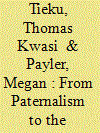

|
|
|
|
|
| Summary/Abstract |
This article explores the working relationship between the United Nations (UN), African Union (AU), and the Economic Community of West African States (ECOWAS) in mediating conflicts in West Africa and the Sahel regions. We argue that through the United Nations Office for West Africa and the Sahel (UNOWAS), the UN, ECOWAS and the AU are working on mediation efforts to transcend traditional conceptualizations of the relationship between the world body and regional organizations. We show that the partnership is grounded on the logic of subsidiarity, informality, elite networks, technical competence, soft skills, and robust social trust. For heuristic purposes, we call the six principles the Chambas Formula, with reference to the centrality of the Special Representative of the Secretary-General for West Africa and the Sahel, Mohamed Ibn Chambas, and the emergence and consistent application of the principles in the mediation setting in West Africa and the Sahel regions.
|
|
|
|
|
|
|
|
|
|
|
|
|
|
|
|
| 4 |
ID:
188477
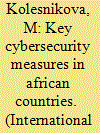

|
|
|
|
|
| Summary/Abstract |
THE SECURITY of the Internet and telecommunications networks has been an increasing national security concern for most nations in recent years, due to the development of 5G and Internet of Things (IoT) technologies, the digitalization of a whole range of governmental and commercial services, the surging popularity of various online services largely because of the COVID-19 pandemic, and the mounting scale of cybercrime, including phishing attacks and financial fraud.
|
|
|
|
|
|
|
|
|
|
|
|
|
|
|
|
| 5 |
ID:
176492
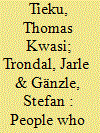

|
|
|
|
|
| Summary/Abstract |
This study contributes to the field of International Public Administration (IPA) and the emerging area of Informal International Relations (IIR) by examining the politics of staffing and recruitment of the African Union Commission (AUC). Although the AUC has become a major political player in international affairs, there is a dearth of knowledge about the civil servants who work for the AUC and who run this paramount pan-African executive body. To address the void, this paper draws on a survey of 137 AUC staff, archival studies and interviews to explore recruitment of AUC staff. Combining organisational theory and informality as analytical lenses, the study demonstrates that, first, many informal international practices (IIPs) are embedded in AUC recruitment processes. Second, the AUC is composed largely of short-term, contracted staff. Finally, it shows that the AUC is dependent on lower-ranked personnel or that it is bottom-heavy. Many of these lower-ranked officials are intimately involved in the making of AUC policies and decisions, putting into question the assumption in existing scholarship that decision-makers of IOs are primarily reliant on top-ranked A-level officials (senior management).
|
|
|
|
|
|
|
|
|
|
|
|
|
|
|
|
| 6 |
ID:
192951


|
|
|
|
|
| Summary/Abstract |
On 23 June 2021, after months of deliberations, the Southern African Development Community (SADC) approved the establishment of the SADC Mission in Mozambique (SAMIM) in response to escalating violent extremism and insurgency by an Islamist armed group, Al-Shabaab or Al-Sunnah wa Jama’ah (ASWJ), in Mozambique’s northern Cabo Delgado province, which posed the risk of regional contagion. SAMIM was deployed under scenario 6 of the African Standby Force (ASF) with a mandate focused on supporting the Mozambican government to combat terrorism and violent extremism in Cabo Delgado. Its mandate also centred on strengthening and maintaining peace and security; restoring law and order; and assisting the government and humanitarian agencies to provide humanitarian relief to the affected population. This paper contributes to raising public understanding of the regional and continental policies and principles underpinning the SADC decision-making process regarding the deployment of peace missions and the effectiveness of SAMIM in fulfilling its mandated tasks until its first anniversary. It identified the relative pacification of Cabo Delgado as a crucial strategic and operational impact of SAMIM’s exceptional military intervention, which facilitated its segue into a multidimensional peacebuilding mission. Six principal constraints-cum-opportunities of SAMIM, which had a significant bearing on its effectiveness, are discussed.
|
|
|
|
|
|
|
|
|
|
|
|
|
|
|
|
| 7 |
ID:
175389


|
|
|
|
|
| Summary/Abstract |
Turkey has been among one of the most active players in African politics over the last decade. The ruling Justice and Development Party (AK Party) governments have changed the traditional foreign policy approach towards Africa. Turkey has sought to develop its strategic relations with non-Western regional and sub-regional organisations during the AK Party governments. In this regard, Turkish Embassy in Addis Ababa was accredited to the African Union (AU) and other sub-regional African organisations since 2005. In this research, the main question is ‘why has Turkey deepened and widened its strategic relations with African regional and sub-regional organizations?’ This research will scrutinise Turkey’s engagement with the African organisations by employing a theoretical approach and a holistic approach. According to the findings of this research, Turkey has changed its traditional approach towards African politics and played a dynamic role in establishing a new global order despite persistent challenges in the world.
|
|
|
|
|
|
|
|
|
|
|
|
|
|
|
|
|
|
|
|
|